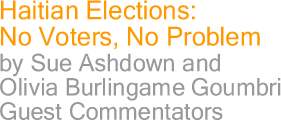
Issue 145 - July 7 2005
Printer Friendly Version
|
The elections planned by the U.S. and its allies for Haiti in the fall are a fiasco that is becoming impossible to conceal. Faced with the hopeless prospect of registering 4.5 million Haitians by August 13th (60 days before the first election on October 13), Haiti's Provisional Electoral Council (known by its French acronym CEP) and the U.N. Peacekeeping Mission in Haiti have taken to issuing surreal and unsubstantiated statements about the voter registration process. By the end of May, out of 436 planned registration offices, the Organization of American States admitted that only 14 had been set up. The 436 offices, were they to exist, would still stand in sharp contrast to the Haitian elections of 2000, where more than 12,000 registration centers and polls served the Haitian people. Observing this logistical nightmare, the National Council of Electoral Observers expressed grave doubts about the feasibility of registering Haitian voters: "It would take 6 months to register 4 million voters in the 436 registration offices projected across the country – that is assuming that the offices were functional today, open 7 days a week, 10 hours a day and staffed by competent technicians." In early June, with the lack of registration centers becoming a public relations disaster, and with less than 2% of eligible Haitians registered to vote, the CEP and the U.N. appeared to agree on a joint communications strategy. Every few days, one or the other would announce the opening of new voter registration centers, and the registration of additional Haitian voters – after all, the numbers would be almost impossible for anyone to verify, especially in the face of the skyrocketing violence in the country. So, during a tidal wave of kidnappings which encouraged the U.S. to withdraw its entire Peace Corps contingent as well as non-essential embassy personnel, and issue a travel warning, the CEP and U.N. reported that within the space of one solitary week in June, voter registration centers in Haiti doubled, and then quadrupled again, with a concomitant increase in voter registration that brought the claimed total registrants to 3.5% of the potential total. One might argue that the average Haitian, having nothing to lose, and therefore nothing to fear from kidnappers, might choose to spend his or her practically nonexistent free time hunting down a registration center in order to be fingerprinted and photographed in return for the right to vote. But it seems unlikely. The average Haitian would have to get out of her neighborhood first. There are no registration centers in the poor neighborhoods and no plans to open any either. Poor Haitians have been terrorized in their own homes by police and ex-militaries backed up by U.N. forces. They have been fired upon by those same forces when they gather in peaceful demonstrations demanding the return of the president they elected last time, with 92% of the vote, Jean Bertrand Aristide. Neither Aristide, nor his party, Fanmi Lavalas, is on the ballot this fall, thanks to the U.S./French/Canadian supported coup, which removed him to Africa last year, and Lavalas has sensibly refused to join the elections unless the attacks against it stop. Of course this is not to be discussed. With Aristide out of the way, the whys and wherefores are of little interest to the international community, who treat the democratic Haitian elections of 2000 and the coup that overturned them as though it were all a bad dream, better forgotten. Time to move on! An election result more favorable to foreign business interests has been in the works since long before Aristide won in 1990 and again in 2000. As in Venezuela, the U.S. has funneled millions of dollars to Haitian opposition parties through the pleasingly named National Endowment for Democracy. The fall elections planned for Haiti are the fruit of that investment; designed to give those opposition parties the platform they have always desired, free of competition from the 900 pound gorilla, Lavalas, but just to cover the bet, free of potential Lavalas voters as well. Just last week, a diplomatic source told Agence Haitienne Presse that the international community was prepared to accept a Haitian election with only 200,000 to 300,000 voters, or less than 7% of the electorate. And why not? Evidence continues to emerge that the same international community that howled about the invasion of Iraq was not only untroubled, but supportive of the 2004 coup in Haiti. Yet, coups are by their nature, nasty affairs that tend to leave lingering doubts about the legitimacy of the replacement government. An election is the tried and true method for erasing those doubts. That the Haitian election is totally rigged seems to trouble no-one. International election observers are already being prepared. Sue Ashdown is affiliated with the Washington, DC branch of the Women's International League for Peace and Freedom, and can be reached at [email protected]. Olivia Burlingame Goumbri is Executive Director of Ecumenical Program On Central America and the Caribbean, also in Washington. |
Your comments are always welcome. Visit the Contact Us page to send e-Mail or Feedback or Click here to send e-Mail to [email protected] e-Mail re-print notice
If you send us an e-Mail message we may publish all or part of it, unless you tell us it is not for publication. You may also request that we withhold your name. Thank you very much for your readership.
|
